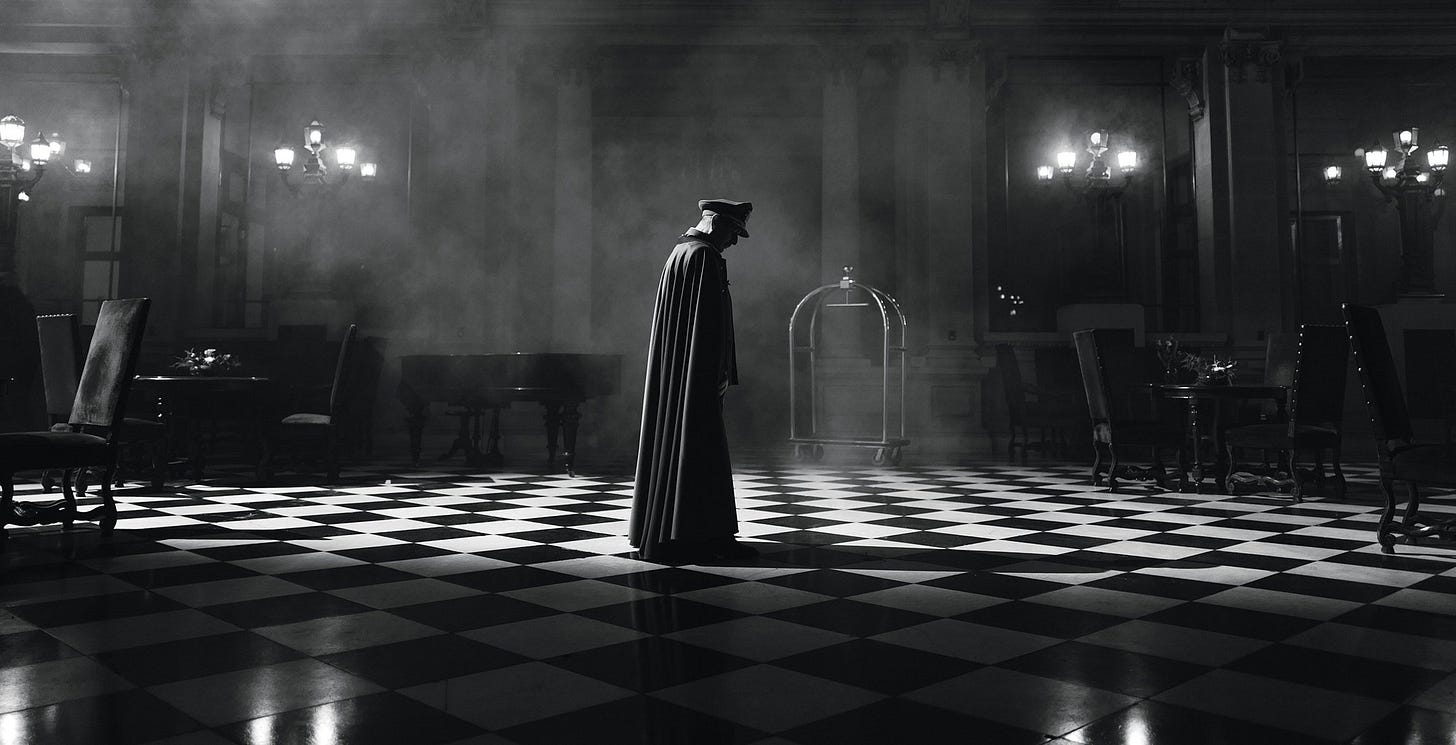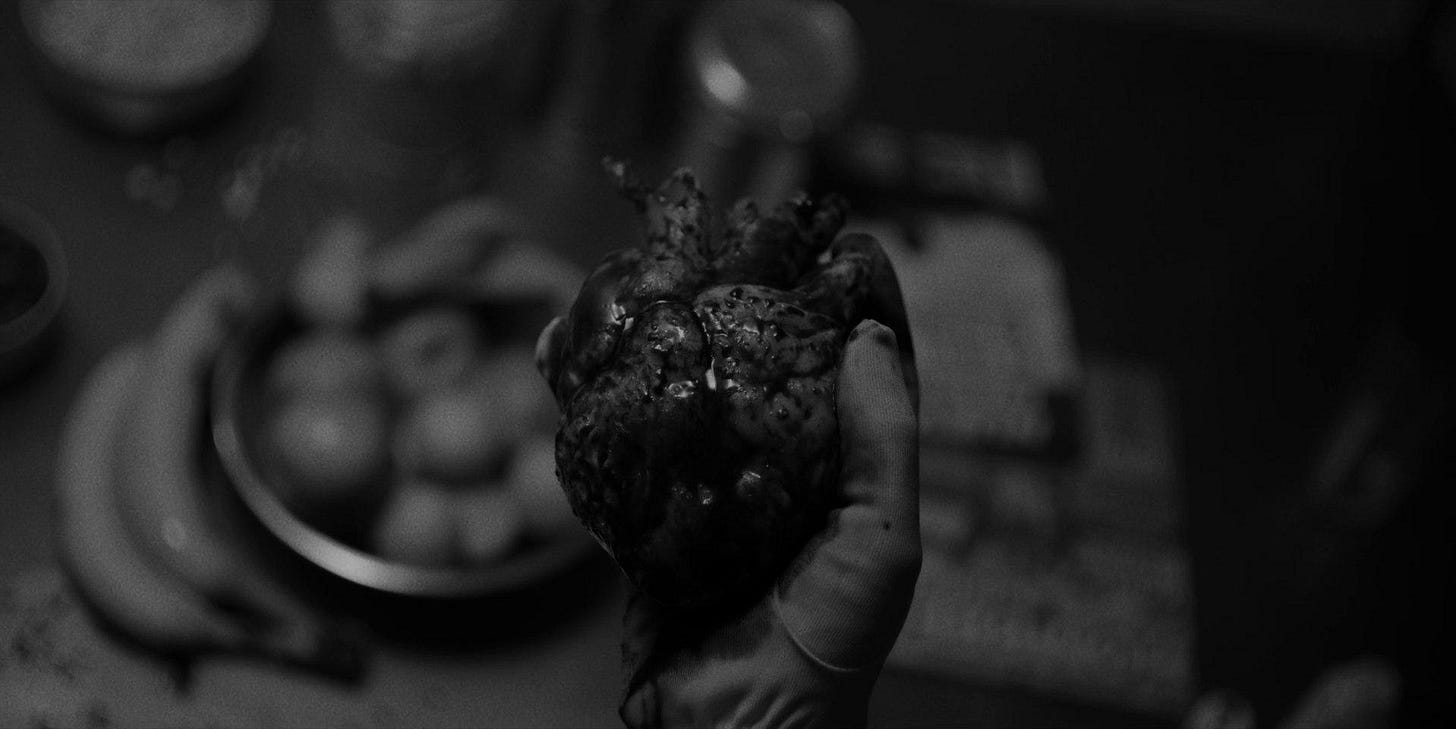A Fascist Vampire
Authoritarianism, corruption, and Pablo Larraín's El Conde.
When I sit down to write these days, anything I thought I was going to post about feels instantly useless. I guess it’s not surprising considering I live in America and every day brings multiple new assaults on truth, democracy, and basic human decency by the Trump regime. This week alone we’ve seen the president send in the National Guard to take over Washington, D.C. in a supremely ballsy authoritarian power grab, the Department of Homeland Security post neo-Nazi recruitment memes on their social media, ICE agents pull up to southern California Home Depots in unmarked cube trucks to kidnap and disappear people, tariff shakedowns, a meeting set between and Trump and Putin to discuss the fate of Ukraine without Ukraine, and then of course there’s the ongoing genocide in Gaza.
Add to that the fact that I’m a writer/director and the current state of the entertainment industry is, as we say in Los Angeles, completely fucked, and it’s a lot to deal with.
So what’s a Substacker to do?
I guess I’ll tell you about a film I saw recently (spoilers ahead.)
The other night I watched El Conde, Pablo Larraín’s 2023 satirical horror fable that reimagines Chilean dictator Augusto Pinochet as a 250-year-old vampire.
In real life, Pinochet seized power from democratically elected socialist President Salvador Allende in a 1973 military coup backed by, among others, the CIA. During his 17 year rule, he persecuted anyone and everyone he considered an enemy — leftists, socialists, his political critics — ultimately arresting or disappearing upwards of 80,000 people, and torturing or killing thousands.
In the film, we begin during the French Revolution, where Pinochet, now called Claude Pinoche, is a royalist French soldier who fakes his own death after he’s outed as a vampire. Not a moment too soon — the monarchy falls and Pinoche quickly pivots to align himself with the workers, watching Marie Antoinette’s execution, after which he licks her blood from the guillotine and steals her severed head.
For the next 150 or so years, he travels the globe feasting on beating hearts as he suppresses revolutionary upheavals, finally landing in Chile, joining the military, and taking on the name Augusto Pinochet. He rises to power by overthrowing the government, amasses great wealth, and commits countless human rights abuses before he’s forced to step down. When authorities start investigating his crimes, he fakes his own death again and retires with his family to a remote farm, where he wants to die — for real.
The only thing is that his wife, Lucia, and butler, Fyodor, who Pinochet bit years ago and turned into a vampire, want to keep him alive. Fyodor was part of the White Russian movement, a faction of militaristic right-wing conservatives opposed to the Bolsheviks during the Russian revolution, and he and Pinochet bond over their love of torture and violence.
It’s beautifully shot in striking black and white, recalling classic vampire films like F.W. Murnau’s Nosferatu and Carl Theodor Dreyer’s Vampyr. The lack of color makes it easier to overlook the violence, as Pinochet’s adult children do. When the blood and beating hearts of Pinochet’s victims are shades of gray instead of red, they can feign ignorance of his vampirism.
When a series of gruesome murders take place in Santiago, his children begin to worry that their father is responsible, and also they want their inheritance. They hire an accountant, Carmen, who happens to also be a nun/exorcist, to find missing bank accounts and determine if their father needs an exorcism.
But instead, Carmen falls under Pinochet’s spell, has sex with him, and has him turn her into a vampire, too. So much for the Catholic Church.
Then Margaret Thatcher shows up. It turns out she’s not only a vampire, too, she’s actually Pinochet’s mother (she was raped by a Strigoi and left the baby Pinochet in an orphanage), so neoliberalism has literally birthed fascism.
The only glaring omission is a representation of the United States’ involvement in the Pinochet regime.
By the end of the film, Pinochet has decided that he no longer wants to die, so he and Margaret Thatcher blend up a shitload of frozen vampire hearts so they can become young again and wreak havoc on another part of the world.
Each era produces its own vampire character as metaphor — early 20th century xenophobia and fears about immigration gave us vampires who were foreigners, like Nosferatu, the backlash against the feminist movement in the late 60s/early 70s gave us lesbian vampires in films like The Blood Spattered Bride, the AIDS crisis in the 1980s gave us vampires like David Bowie’s character in The Hunger.
Now we’ve entered our vampire as fascist era, and I am 100% here for it.
Until next time,
Tara



